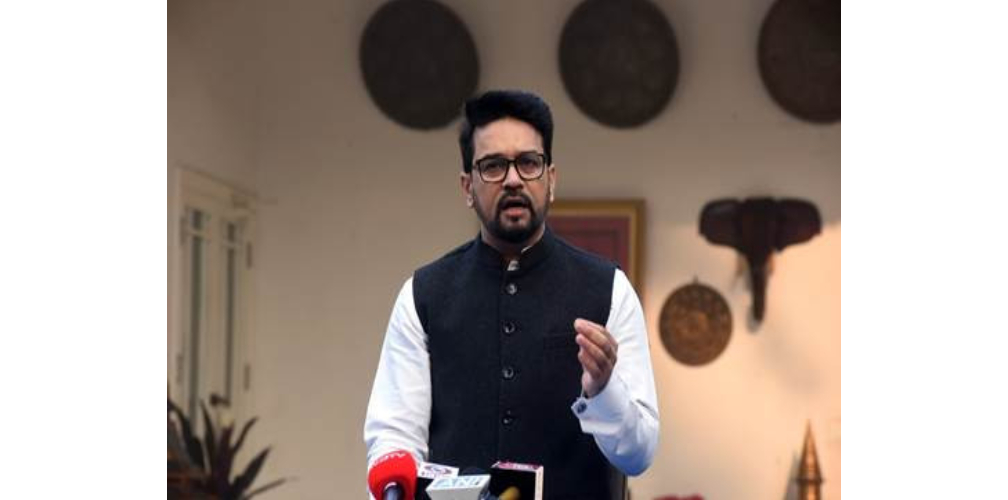New Delhi, 20 December 2022: The policy focus of Government of India is ‘Zero Tolerance Against Terrorism’, Union Minister Anurag Thakur said today. In a detailed statement to the media at his residence, on the efforts of the Government to counter terrorism, Thakur said that while Government has worked on the legal front by strengthening UAPA, at the same time it has also taken steps at the enforcement level by giving National Investigation Agency a truly federal structure by introducing National Investigation Agency (Amendment) Act and the collective effect of these measures has been a weakening of the ecosystem of terrorism.
Highlighting that India has raised its concerns at the highest global levels, he said that in international conferences and meetings, Prime Minister Narendra Modi has always pressed the world to unite against terror. The 90th Interpol General Assembly witnessed a participation of over 2000 foreign delegates and culminated in the announcement of ‘Global Action Against Act of Terrorism’, he added.
“The Governments resolve against terror has been displayed time and again from Surgical Strike to Balakot Strike. The action by our armed forces has caused a significant drop in terrorist incidents in Jammu and Kashmir. Similarly, we have achieved a 94% conviction rate in terror financing cases” Thakur said.
The Minister spoke at length about the efforts of the Government towards creating an atmosphere of peace in North East and said that an era of peace has dawned in North Eastern region of India since 2014 when insurgency violence has seen a sharp decline of 80 percent and civilian deaths have seen an 89 percent drop. Added to this is the achievement of surrender by six thousand militants since 2014, he underlined.
The Government is committed to go beyond armed action to counter terrorism and has worked to create an atmosphere of lasting peace across the region. These peace treatises are a legacy of the achievements of the Government. Underlining this aspect, Thakur listed the peace agreements signed by the Government
Bodo Accord in January 2020,
Bru-Reang Agreement in January 2020,
NLFT-Tripura Agreement in August 2019,
Karbi Anglong Agreement Sept 2021,
Assam-Meghalaya Inter State Boundary Agreement in March 2022.
Speaking on the Armed Forces Special Powers Act, the Minister said that AFSPA roll back has been only a matter of discussion all this while but the Government rolled it back from a large part of North East including the whole of Tripura and Meghalaya. It remains in force in only 3 districts of Arunachal Pradesh, 60 percent of Assam is free of AFSPA, 15 police stations under 6 districts have been taken out of the category of Disturbed Area, Disturbed Area notification has been removed from 15 police stations in 7 districts, the Minister informed the media.
The Minister also delved into the rescue operations run by the Government over the years. Highlighting that rescuing Indian lives in distress are of a paramount concern for the Government and the country has been on the fore front of running rescue operations across the world, Thakur listed the achievements.
22,500 citizens were rescued under Operation Ganga in February-March 2022,
670 Indian citizens were rescued from Afghanistan in Operation Devi Shakti.
In one of the biggest successes of rescue operations, 1.83 crore citizens were brought back home during COVID19 crisis, under Vande Bharat Mission in the year 2021-22.
India rescued 654 people from Wuhan in China.
Not just Indians, India has also offered a helping hand to foreign citizens under distress. In 2016, under Operation Sankat Mochan, 155 people including 2 Nepalese citizens were brought back from South Sudan. 5000 Indians were rescued from Nepal during Operation Maitree while 170 foreign nationals were also rescued from Nepal. Operation Rahat 6,710 people were rescued from Yemen including 1,962 foreigners.
Speaking on the status these efforts have created for India in the world, he said that India is increasingly being seen as a country that readily offers all assistance to other countries in their times of crisis and also as one that acts strongly against terrorism, while a neighboring country is only seen as one sheltering terrorism and propounding values of violence.
